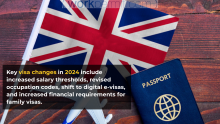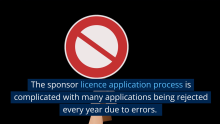Support migrant centric journalism today and donate

By Sanwar Ali:
Introduction
In an era where global mobility and remote work are commonplace, the UK has made significant changes to its immigration laws. from 31 January 2024. These changes are designed to offer greater flexibility for both visiting professionals and international businesses, enabling them to better adapt to the evolving global workplace.
The UK government has stated that these changes aim to make the UK a more attractive destination for international talent, fostering greater international collaboration and bolstering the UK's economy in the process. This article will delve into the specifics of these changes, exploring their potential benefits, criticisms, and the impact they could have on various stakeholders. This is against a background where the Government is taking steps to reduce overall levels of immigration into the UK.
Overview of Changes
The UK's immigration rule amendments encompass a broad range of areas:
Remote Work
As long as work isn't their main intention, individuals visiting the UK can engage in remote work for their international employer. This allows people who are in the UK for a short time for an allowed reason (e.g., tourism, visiting family) to also engage in work activities such as attending meetings or conferences, conducting site visits, dealing with emails, making calls, and other related tasks, as long as immigration officials are convinced that the visitor is not using frequent or repeated visits to stay in the UK in the long term.
The Visitor Rules change simply formalizes the position already outlined in government policy guidance. Expectations will still be for visits to last only up to 6 months for any one trip and we will continue to assess the real purpose of business trips in the same way.
Intra-corporate Activities and Visitor Remote Work
A significant change is the clear recognition of remote work as a common business activity for visitors. This means that employees of overseas companies are now permitted to carry out certain activities in the UK, such as attending meetings, negotiating contracts, or delivering training.
Employees from non-UK-based companies within the same corporate group are usually prohibited from working directly with clients of UK-based companies. In just a few cases, this rule will change. Non-UK-based company employees can now directly assist clients with advice, consultation, training, or knowledge sharing, as long as it's not their primary job abroad or a project/service provided by their overseas employer to UK clients. The UK branch has a requirement to fulfil the work for delivering a project or service to the client.
Companies outside the UK and linked businesses in the UK who have short-term business visitors will still have to clearly explain the arrangements and make sure that any activities with clients meet these new rules.
Legal Professionals
At the moment, advising a UK-based client on specific international litigation and/or an international transaction is the only activity that an overseas lawyer can officially do in the UK as a business visitor. However, there is guidance that permits overseas legal professionals to do advocacy, dispute resolution work and participate in the preparation of hearings. The changes will make these activities official by adding them to the Visitor Rules. The changes will also let overseas lawyers or legal professionals act as arbitrator or mediator, appear in court where the relevant jurisdiction allows this, teach and attend conferences.
For legal professionals or overseas lawyers, it is important to determine if their intended activity falls within a one-month paid engagement permit, allowing them to receive payment from a UK source.
Research Activities
The new rules also expand the permissions for scientists, researchers, and academics visiting the UK1. These individuals can now participate in formal exchange programmes with UK counterparts, collaborate on research projects, and gather data during their visits.
Permitted Paid Engagements (PPE)
Permitted Paid Engagements are no longer a separate category, but part of the Standard Visitor route. This change does not have a major impact, but it enables speakers at conferences who are invited to give one or a few talks and speeches to be paid by a UK source.
All visitors who come to the UK to do an activity that is a permitted paid engagement still need to have planned their activity before they travel to the UK, state this in their application or entry to the UK and do the activity within the first 30 days of being in the UK as a Visitor.
Youth Mobility Scheme
Finally, the UK has expanded its Youth Mobility Scheme, enabling more young people from abroad to live, work, and study in the UK. Notably, the duration of these visas has been extended, providing greater opportunities for international youth to gain valuable work experience in the UK.
Potential Benefits
The updated UK immigration rules present several potential benefits. For businesses and professionals, they offer increased flexibility and opportunities for international collaboration1.
For example, the inclusion of remote work as a permitted activity for visitors could make it easier for international businesses to collaborate with UK-based partners, potentially boosting the UK's global competitiveness.
Similarly, the expansion of the Youth Mobility Scheme may attract more young talent to the UK, benefiting both the individuals involved and the businesses that employ them1.
Critical Analysis
While these changes are promising, they are not without potential downsides and criticisms. There are concerns that the expanded permissions for business visitors could complicate immigration enforcement and oversight1.
Moreover, the relaxation of rules around PPE could potentially open the door to exploitation, especially if there is inadequate oversight of these arrangements1.
The changes to the Youth Mobility Scheme, while positive, may not go far enough to address broader immigration issues and skill shortages in the UK1.
Finally, the effectiveness of the post-Brexit business visitor rules in meeting the needs of businesses and professionals in a changed EU-UK landscape remains to be seen.
Stakeholder Impact
The new immigration rules are likely to have significant implications for a range of stakeholders, including UK businesses, international professionals, legal experts, and potential visitors.
For businesses, the changes offer increased flexibility in terms of international collaborations and access to overseas talent. However, they will also need to navigate the complexities of the new rules and ensure compliance.
International professionals and potential visitors will have more opportunities to work and engage in business activities in the UK, but they may also face greater scrutiny and complexity when applying for visas1.
Conclusion
In conclusion, the UK's new immigration rules represent a significant shift in the country's approach to international talent and business activities. While they offer several potential benefits, they also raise several concerns and challenges.
How Workpermit.com Can Help with Sponsor Licences
If you need help with employing Skilled Workers and applying for a Sponsor Licence, including complying with your Sponsor Licence obligations, HR responsibilities, etc workpermit.com can help.
For more information and advice, please contact us at 0344 991 9222 or at london@workpermit.com(link sends e-mail)





















